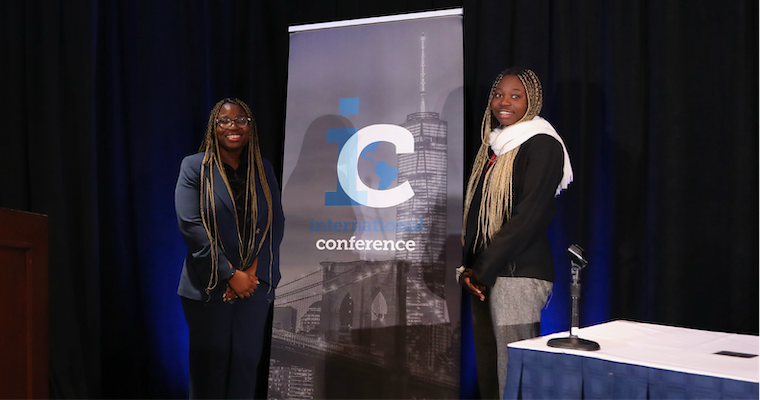Trust Beyond Borders
A Leavey finance senior’s company bridges the credit gap for international students, entrepreneurs and more

The average college senior has not launched an international business and built a product that has 100,000 users. But perhaps Eve Idusuyi is not the average college senior.
For one thing, the Leavey School of Business finance major came to Santa Clara with some clear goals in mind.
“I knew I had some hard skills of quantitative analysis, and I knew I wanted to be in finance,” Idusuyi says. “I know I wanted to be involved in investment. Having lived in three countries and seeing the impact of capital allocation in the world, I just really understand the importance of capital, and how, if allocated properly, you can really have a significant impact on a community.”
The startup she co-founded, CreditCliq, is designed to ease access to capital for international students and entrepreneurs. CreditCliq provides a fin-tech tool that collects and curates credit data from a person’s home country to be shared with financial institutions where they may live, work or study in the future.
The challenge CreditCliq is trying to solve comes from credit systems that either do not talk to each other or use different metrics. A person with a long and trustworthy credit history in one country might find their data simply does not carry over to their new home country if they move abroad.
“We want to build trust beyond borders,” says Idusuyi, who has lived in multiple parts of the U.S., Canada and Nigeria. “Credit is an important form of trust. When we started looking at this, we were asking, “When you move to a new country, why do you have to start again when you’ve already proven you’re trustworthy?”
Proof of Concept
Idusuyi developed the first iteration of the business while with a different issue in mind while she was still in high school in California. Crowdfunding was a major trend at the time, so her initial idea was a crowdfunding tool designed to help international students gain funding for their studies via fractional lending from individuals.
She quickly realized she lacked some business basics, though — including funding. When it came time to pick a school to further her business career, she chose Leavey and Santa Clara University for a couple of reasons: beauty and convergence. “It stole my heart at first sight. But I also realized I can combine finance and technology here.”
A freshman year experience with the Bronco Ventures Accelerator (BVA) let her know she was at the right place. BVA, a center that supports budding entrepreneurs, granted her a $5,000 stipend that provided cushion for growing and incorporating the business. But perhaps more important, her experience at BVA — and in an introductory business course with professor Tonya Monsef, who would become a long-term mentor — gave her new skills and new perspectives that allowed her to rethink the company’s purpose.
Along the way, she heard stories from international students about their difficulty finding apartments because of nonexistent U.S. credit histories. She listened as her mother described similar struggles from her time as a student. She thought about how credit history affects everything from student funding to housing to small business loans for entrepreneurs.
As a result, Idusuyi and her partners — her sister, Angel Idusuyi, and friend Eniola Osabiya — refocused the company and renamed it CreditCliq. They also identified a country that was ripe for testing her new idea: Nigeria. The country’s citizens all have a Banking Verification Number (BVN), which Idusuyi compares to a Social Security Number.
The company’s initial goal there was simple: Create a free API-based app that uses the BVN to allow people to search and gather their credit history and monitor for fraud. Over time, though, Idusuyi and company have expanded and created partnerships with credit bureaus not only in Nigeria, but also the Philippines and Mexico.
“We’re focusing on establishing relationships with these credit bureaus to be able to use the data,” Idusuyi says. “Then we’ll be able to bring the data over here to the U.S. and convert it into standards here that a typical U.S. financial institution would use to assess risk.”
CreditCliq 1.0, as she calls the current iteration, earned roughly 100,000 users in Nigeria. It has also earned accolades at numerous entrepreneurial competitions, including first place at the Silicon Valley Business Plan Competition, third place at the SunStone CSU Startup Pitch competition, first place at Princeton University's Impact Challenge, and second place at the University of San Diego’s Global Social Innovation Challenge.
Along the way, like any good founder, Idusuyi has learned from her surroundings. She relished the opportunity to develop a thorough business plan and pitch to real — and “intense” — Silicon Valley venture capitalists as part of Dan Trepanier’s entrepreneurial finance course. She has learned the value of networking, such as when Monsaf introduced her to a board member from the fourth largest Credit Union in the United States .
She’s made her mark on the school, too, as a founder of the Women in Investment club — something she started as a freshman. The club aims to encourage more women to go into finance and support the ones who choose the male-dominated field.
As for CreditCliq, she takes a long, patient view of its future. The current phase is about creating partnerships, gathering data and developing models that can be shared with financial institutions and credit bureaus as proof of concept in the future. When she graduates, she’ll continue working on CreditCliq and further hone her capital allocation skills, all to the benefit of the evolving business.
“There’s nothing like learning on the job,” Idusuyi says.
